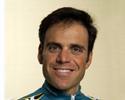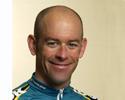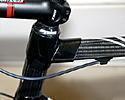
Recently on Cyclingnews.com |
Tales from the Peloton
Healthy and good - Team Health Net presentation
By Jeff Tse
 |
Without excessive fanfare, Momentum Sports Group made a surprising announcement yesterday of a new Division 3 team in the US professional circuit. The new team, called Team Health Net is filled with top names in US professional cycling. Led by long time strongman veteran from the Mercury era Mike Sayers, Team Health Net will take on the other top trade names like Saturn, Prime Alliance, and Navigators in this season’s National Racing Calendar. The team conveyed a strong sense of confidence that they will bring about a fresh new chapter to racing in America.
While Mike Sayers will be the designated leader on the bike, Kevin Klein will make the call from the team car as the director sportif. Klein is an eighteen-year veteran at the elite level that includes two years of racing in Europe. The collaborative partnership between the team leader and director is reminiscent of that between Lance Armstrong and Johan Brunyneel, which has been so successful in the last four years. Sayers and Klein will be guarded by a very respected group of riders; who could themselves be leaders of smaller teams. Some notable names include Russell Stevenson (former Prime Alliance), Scott Price (Canadian National Road Champion), Chris McGovern (former Jelly Belly) and John Hunt (former Sierra Nevada and multi-state champion in time trials).
Interestingly, the team also has a Russian accent. Out of the 18 riders, three are from the Belarus National Team. Led by their coach Dimitriy Badeka, the three riders sport invaluable experience as former European professionals. One of the three, Yauheni Seniushkin boasts having ridden in not only one grand tour in the last two years, but three. He rode the Giro and the Vuelta in the same year in 2002 for Panaria-Fiordo.
 |
When asked about the goals of the team for the coming year, The Sea Otter Classic in April was high on the priority list. The prominent spotlight of the Sea Otter Classic will provide an important stage to promote the sponsor ’s name on their home turf. The team’s primary sponsor, Health Net of California, is a health insurance provider with most of its market share in California and surely will be in attendance at the race. Other primary objectives include the Columbia River Bank Cascade Classic in Bend, Oregon, the New York City Cycling Championship, and the all-important San Francisco Grand Prix in September. Both the New York City and San Francisco events are relatively new but they have become overnight successes and the highlights of the U.S. racing calendar.
For anyone attending the press conference, it was very apparent that there was one principle stressed repeatedly. That was cohesion. Mike Sayers and Kevin Klein felt that the connection their teammates have with one another is what gives them the edge over their competitors. While certain buzzwords are often times overused to put in place of what is not really there, the leaders of Team Health Net seem to exemplify their conviction quite convincingly at the press conference.
As an observation from his 11-year career, Sayers was quick to point out that he has seen riders being treated no better than a commodity by other teams. Agreements are reached based on the perceived value of what the rider could offer verses how much he cost. When first approached by Klein and Bob Hooks back in October, Sayers was on the verge of retiring from professional cycling, though not due to the physical demands of the sport but the mental frustration. Recalling the first brainstorming sessions, Sayers felt “refreshed” from the ideas Klein was putting on the table. When asked what specifically intrigued him, he responded that it was a shift to the compromising belief of “We need you and you need us.” It was not long before that Sayers, Klein and company found the commitment and sacrifices they make to be something that they are now proud of. They believe the commitment is what sets them apart from the other trade teams this upcoming season. During the winter months, Sayers relocated from Arizona to California for this new endeavor. Being a first year team, despite the surprising generosity of the sponsors in this ailing economy, the resources will still be limited compared to other established outfits like Saturn. Sayers is however convinced that it is not the size of the dog but rather the size of his fight that matters most. While there are risks with most ventures, Sayers is excited to start what he calls the 2nd part of his career.
 |
When asked about being the leader of a big team for the first time, he did admit the situation does challenge him. Despite winning a respectable number of races throughout his career, he had always felt he was playing second fiddle to bigger names on those teams. Now he is getting the chance he has been riding hard for. As designated team leader, he does not foresee the type of team infighting he experienced in the past. His leadership will involve making live tactical decisions himself during the race. Sayers’ leadership will also involve keeping the cohesion that is the trademark of the team. All the riders on the team gave up the first week of racing this past week for one last training camp together to foster that commitment.
While new teams are introduced every season without too much dissimilarity, the introduction of Team Health Net also brought about a new concept in professional cycling management in the US. Team Health Net is owned by Momentum Sports Group www.mosportsgroup.com <http://www.mosportsgroup.com/> . It is a limited liability company with its mission to handle the management of the team. The company with its team as its primary asset will operate similar to a business. When asked what is different about Momentum Sports Group to cycling management as it is today, Greg Raifman, CEO and owner, sees one reoccurring problem in the system. The crux of the issue lies in the fact that typical management of teams today comes not from a business management background but a cycling one. The characteristic situation involves a professional rider becoming a director, and then he is forced to be a businessman having to manage the team. Raifman is convinced this methodology does not work. The director does the business management poorly as he has to learn at a breakneck pace to keep up and manage his team at the same time. He believes the preferable situation is having individuals who have the business acumen run the financial aspect of the cycling team while the director or coach who knows the sport run the athletic piece.
 |
Momentum Sports makes sure the Health Net cycling team is run efficiently and financially responsible. It manages the tasks such as salaries and sponsorships at a separate level from the director and riders. The organization also makes sure the riders on the team are taken care of in terms of their financial and mental well being so that the riders can focus on what they do best, train and race. This is a rather humanistic approach that has been pioneered by Thom Weisel and the US Postal organization. US Postal is now a world-class organization to the envy of the cycling world. Weisel and Raifman may be thinking on the same wavelength as both are financiers with a successful history of capitalizing on their ventures.
While this model of sports management may seem novel in US cycling, it is definitely prevalent in other popular sports in America. We see it in baseball, football and basketball. For instance, the baseball team New York Yankees is owned and managed by a man name George Steinbrenner. While his group deals with the financial management of the team, it is separate from coach Joe Torre who deals with making sure the team wins. Each doing their respective part in what they do best.
Momentum Sports Group plans to branch out into other avenues of the cycling world in the next few years. Their plans include putting together a San Francisco Grand Prix type event in Oakland, California. Creating alliances with similar organizations is another possibility. Raifman sees potential growth for cycling in America. The Lance Armstrong story has definitely done enormously for cycling recently. What will happen from this point depends heavily on the resources and funding that will go into the sport.
Team Health Net plans to kick off their season this weekend with two races in the central California area. Their stage-racing schedule will begin with the Pomona Stage race in March, then Solano Bicycle Classic and Redland Bicycle Classic building up to their first primary objective of the season at Sea Otter. With their brand new Look KX Light frames, the team looks ready to take on the old boys as the new kid on the block. By the middle of April, it will be very interesting to see the impact Team Health Net has on professional racing in America.
